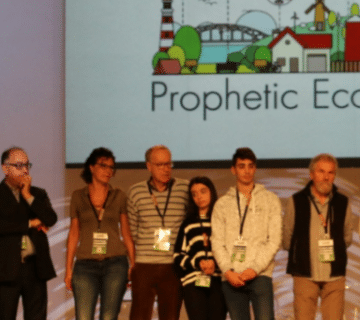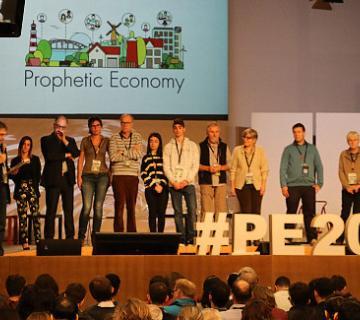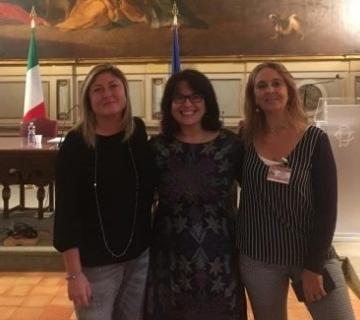9 April 2001
Q – What are the innovations, ten years on, which have emerged at the conclusion of this school for entrepreneurs who adhere to the Economy Communion project?
After ten years following the birth of the Economy of Communion project we felt the need everywhere to take stock of the situation, to see what new horizons were opening up in front of us. This line of action was indicated to us by Chiara Lubich, in her keynote speech, in which she expressed the desire to emphasise and to relaunch the original inspiration underlying the project.
The theme focussed on four fundamental points:
The original intention of the project which is to give help to the needy through the sharing of business profits.
The “culture of giving” seen as the cultural humus which lies at the basis of business activity.
“New people”, that is, lay people who wish to consecrate human realities.
As a consequence of this, the development of schools of formation for entrepreneurs.
By launching these four points, Chiara Lubich indicated the paths to follow, paths which the business men and women present undertook to pursue with great seriousness and commitment. In the three-day program, the first day was dedicated to the life and the reality of the businesses. The second day was dedicated to the ideas and the economic theories which underlie the Economy of Communion and which could illuminate the life and action of the businesses.
A great contribution was also given by experts who gave entrepreneurs the impetus to launch this idea. Business men and women of the same industry sector got together in workshops, according to language groups. This gave the opportunity for dialogue, for in-depth discussions and for the gathering of ideas.
Another important point was the launching of Chiara’s idea to create industrial parks within the little towns of the Focolare Movement.
Q – Have new initiatives emerged from this school?
The new initiative was precisely that of creating industrial parks within the little towns of the Movement. Already ten years ago, an industrial complex was developed adjacent to Araceli, the little town of the Movement near San Paolo in Brazil. The complex now includes 6 businesses and is a credible witness to the Economy of Communion.
This year Chiara launched the idea that a similar industrial park be constructed in Loppiano, the little town of the Focolare Movement near Florence.
Chiara repeated what she had said in Brazil “We are poor but we are many”, and so it’s a matter of raising funds, not only through the contributions of business owners, but through contributions given by all those – within the Focolare Movement and outside it – who love the idea of the Economy of Communion.
Q – Do you mean shareholders?
Yes, a sort of share-holding system which came into effect during the meeting itself. A significant sum of money has already been raised to start off this activity.
Q – What would the significance be of these little towns with an industrial park?
The identity of the little town of the Focolare Movement is that of shouting out the Gospel through its way of life. It is a witness of evangelical life in a normal context, with relationships of charity, of unity, of solidarity among people and ethnic groups. The industrial park would endow the town with another dimension: to give witness to that evangelical life which is capable of penetrating all aspects of human life, spiritual aspects as well as earthly aspects.
Q – Through the dialogue that emerged during these days, what will the Economy of Communion bring to the current world economic crisis which is creating an ever-increasing gap between rich and poor?
In this sense Professor Stefano Zamagni gave a specific contribution during the panel discussion which was composed of four experts of different nationalities. He said that one of the essential contributions of the Economy of Communion was that of injecting a new paradigm into this climate of competition – which is typical not only of economic activity but which is invading all dimensions of life, from the family unit to the political arena, causing grave repercussions for human life – a paradigm which is not one of competition, but a paradigm of love, of unity. He considers this to be one of the greatest contributions the Economy of Communion can give.
Another expert, Professor Emanuela Silva, from Portugal, affirmed that the Economy of Communion gives a theoretical contribution to the importance of solidarity and sharing in a world, such as that pertaining to economics, in which individualism reigns, in which scientific rationality and the affirmation of self are the fundamental paradigms. With the Economy of Communion what is introduced into this fabric is the sense of solidarity and the sense of sharing.
Q – In view of the current research in the field of economy, would you say that the values of Economy of Communion businesses constitute a response or do they contradict what is maturing in the theoretical elaboration of economics?
It is in contrast with the dominant trends of globalisation. In the world of economy there exists a sector which we could call an alternative economy or third sector or economy for solidarity, or civil economy. There are a whole series of proposals which are in direct contrast with the rational and individualistic economy, the neo-liberal and market economy. The Economy of Communion aligns itself with these forms of alternative economies giving, however, its own specific contribution.
Q – What sort of contribution?
Precisely that of permeating the economy of profit with those values of solidarity and sharing which are normally inherent in a non-profit economy, that is, an economy which is not after the accumulation of wealth. The Economy of Communion operates within the market economy, that is within a profit-making economy, which does seek to produce profits but which volunteers to share these profits with the disadvantaged members of our society.
Q – Can we envisage then, since we’re in the new millennium, that this new economic trend will have an impact on the great economic currents of the world?
We certainly hope so because, as Chiara affirmed very strongly, this is not purely the work of human beings but the work of God. We are believers; we are convinced that the paternity of God, that His presence operates also in our earthly affairs and therefore this project is not only dependent on our efforts but that there is a powerful impetus by the Holy Spirit who responds to the needs of humanity. This is where our wisdom, hope and certainty lies: that the Economy of Communion will have a future, a powerful future for the development of the economic world and the economic ideas of this third millennium.


 Italiano
Italiano Español
Español Français
Français Português
Português


